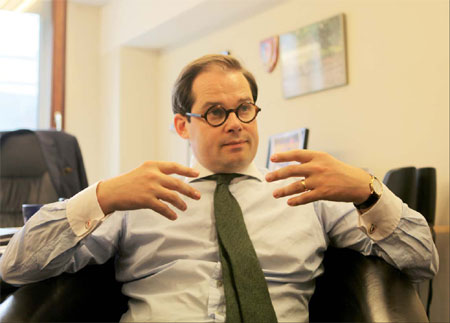Greater role to play on world stage
China should be more assertive in its global role, says think tank founder
|
China should have more dialogue with international institutions such as the WTO and the IMF, says Swedish economist Fredrik Erixon. Fu Jing / China Daily |
Fredrik Erixon urges Chinese leaders to have a greater voice and influence in international organizations.
"Though the old powers are reluctant, China deserves global roles in line with its rising economic clout, and Chinese leaders should have the determination to realize this in the coming years," says Erixon, a Swedish writer and economist, at his Brussels office, which is within walking distance of the headquarters of Europe's major institutions.
Erixon got his first job as adviser to the Swedish prime minister at age 23. In 2006, he founded the European Centre for International Political Economy, now one of the most influential think tanks and lobbying groups from among more than 1,000 surrounding the EU headquarters.
Much of its research interests in recent years have centered on China, due to its economic growth. In the spring, it organized a debate on China's role in the international system.
Erixon expects China's new leadership to send more encouraging signals and intentions in November, when the Central Committee of the Communist Party of China makes significant decisions on the new agenda for reform to further invigorate social and economic development.
He believes they will also focus on strategies and actions for extending the country's global influence.
"November is a good time for the world to see what the leadership focuses on, not only in economic reforms but also its external strategy," he says, claiming Chinese leaders have not revealed enough about how they intend to change long-term policies.
"As China has become bigger and bigger in the world economy, it should formulate foreign policy which responds to its economic needs and economic interests," says Erixon. "We don't see it at present, but it will be more obvious in the coming 10 to 20 years."
Erixon believes China's non-interventionist foreign policy is going to change by exerting more influence in international organizations such as the United Nations, the International Monetary Fund, the World Bank and the World Trade Organization.
"The world is getting complicated, and China will find its own ways to communicate on how to use these organizations and connect its own strategic and economic and foreign policies to a broader global agenda," he says.
That means the older powers would lose rights, he adds, and they should accept the reality that they need to play a lesser role. For example, within the IMF, China and Italy at present share roughly the same voting rights.
"So in the coming 10 years, what kind of leadership China should play and offer for other countries is a big issue," Erixon says.
He recognizes that the Chinese leadership has invested much time and energy in diplomacy to help other countries understand China's intentions and policies.
The meeting between Xi Jinping and Barack Obama in the US after Xi became president was one of the "active dialogues" proposed by China, Erixon says.


























